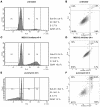BRAF gene duplication constitutes a mechanism of MAPK pathway activation in low-grade astrocytomas
- PMID: 18398503
- PMCID: PMC2289793
- DOI: 10.1172/JCI33656
BRAF gene duplication constitutes a mechanism of MAPK pathway activation in low-grade astrocytomas
Abstract
The molecular pathogenesis of pediatric astrocytomas is still poorly understood. To further understand the genetic abnormalities associated with these tumors, we performed a genome-wide analysis of DNA copy number aberrations in pediatric low-grade astrocytomas by using array-based comparative genomic hybridization. Duplication of the BRAF protooncogene was the most frequent genomic aberration, and tumors with BRAF duplication showed significantly increased mRNA levels of BRAF and a downstream target, CCND1, as compared with tumors without duplication. Furthermore, denaturing HPLC showed that activating BRAF mutations were detected in some of the tumors without BRAF duplication. Similarly, a marked proportion of low-grade astrocytomas from adult patients also had BRAF duplication. Both the stable silencing of BRAF through shRNA lentiviral transduction and pharmacological inhibition of MEK1/2, the immediate downstream phosphorylation target of BRAF, blocked the proliferation and arrested the growth of cultured tumor cells derived from low-grade gliomas. Our findings implicate aberrant activation of the MAPK pathway due to gene duplication or mutation of BRAF as a molecular mechanism of pathogenesis in low-grade astrocytomas and suggest inhibition of the MAPK pathway as a potential treatment.
Figures





References
-
- Ohgaki H., Kleihues P. Population-based studies on incidence, survival rates, and genetic alterations in astrocytic and oligodendroglial gliomas. J. Neuropathol. Exp. Neurol. . 2005;64:479–489. - PubMed
-
- Watanabe K., et al. Incidence and timing of p53 mutations during astrocytoma progression in patients with multiple biopsies. Clin. Cancer Res. 1997;3:523–530. - PubMed
Publication types
MeSH terms
Substances
LinkOut - more resources
Full Text Sources
Other Literature Sources
Medical
Molecular Biology Databases
Research Materials
Miscellaneous

